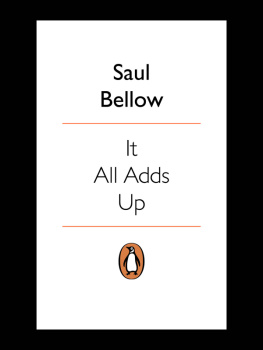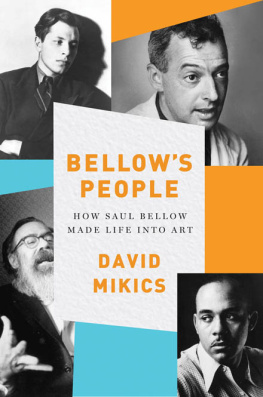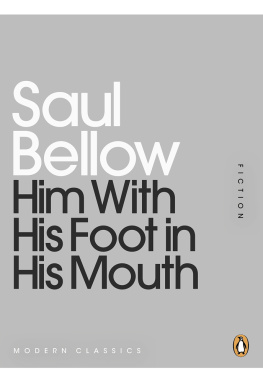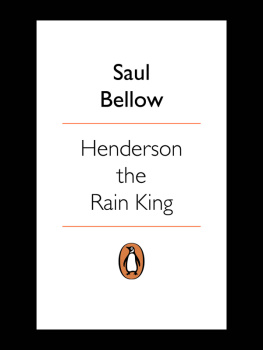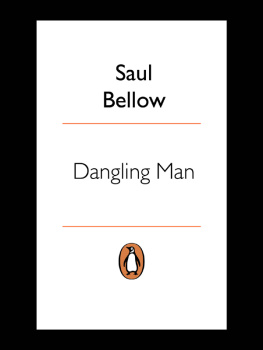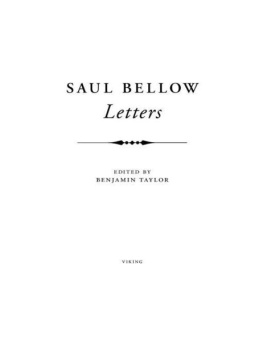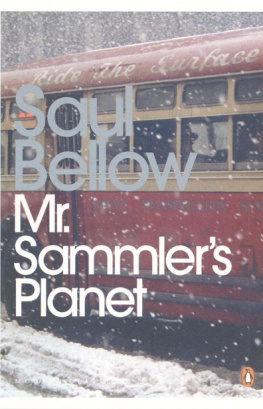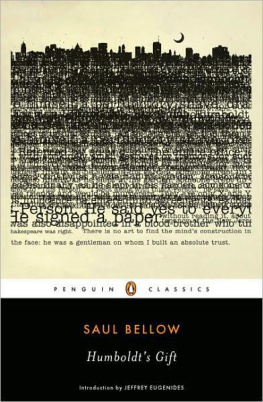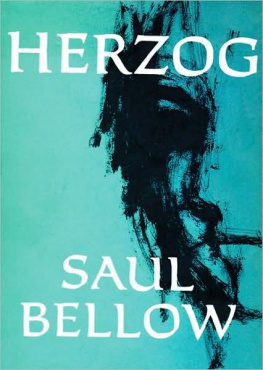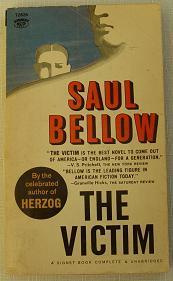Bellow - More Die of Heartbreak
Here you can read online Bellow - More Die of Heartbreak full text of the book (entire story) in english for free. Download pdf and epub, get meaning, cover and reviews about this ebook. year: 2016, publisher: Penguin Books Ltd, genre: Detective and thriller. Description of the work, (preface) as well as reviews are available. Best literature library LitArk.com created for fans of good reading and offers a wide selection of genres:
Romance novel
Science fiction
Adventure
Detective
Science
History
Home and family
Prose
Art
Politics
Computer
Non-fiction
Religion
Business
Children
Humor
Choose a favorite category and find really read worthwhile books. Enjoy immersion in the world of imagination, feel the emotions of the characters or learn something new for yourself, make an fascinating discovery.

- Book:More Die of Heartbreak
- Author:
- Publisher:Penguin Books Ltd
- Genre:
- Year:2016
- Rating:5 / 5
- Favourites:Add to favourites
- Your mark:
- 100
- 1
- 2
- 3
- 4
- 5
More Die of Heartbreak: summary, description and annotation
We offer to read an annotation, description, summary or preface (depends on what the author of the book "More Die of Heartbreak" wrote himself). If you haven't found the necessary information about the book — write in the comments, we will try to find it.
More Die of Heartbreak — read online for free the complete book (whole text) full work
Below is the text of the book, divided by pages. System saving the place of the last page read, allows you to conveniently read the book "More Die of Heartbreak" online for free, without having to search again every time where you left off. Put a bookmark, and you can go to the page where you finished reading at any time.
Font size:
Interval:
Bookmark:




PENGUIN MODERN CLASSICS
SAUL BELLOW (19152005) is the only novelist to receive three National book awards, for The Adventures of Augie March, Herzog, and Mr Sammlers Planet. In 1975, he won the Pulitzer Prize for his novel Humboldts Gift. The Nobel Prize for Literature was awarded to him in 1976 for the human understanding and subtle analysis of contemporary culture that are combined in his work. In 1990, Mr Bellow was presented the National Book Award Foundation Medal for distinguished contribution to American letters. He has also received the National Medal of Arts. His books include Dangling Man (1944), The Victim (1947), The Adventures of Augie March (1953), Seize the Day (1956), Henderson the Rain King (1959), Herzog (1964), Mosbys Memoirs (1969), Mr Sammlers Planet (1970), Humboldts Gift (1975), To Jerusalem and Back (1976), The Deans December (1982), Him With His Foot in His Mouth and Other Stories (1984), More Die of Heartbreak (1987), A Theft (1989), The Bellarosa Connection (1989), Something to Remember Me By (1991), It All Adds Up (1994), The Actual (1997), Ravelstein (2000) and Collected Stories (2001).
MARTIN AMISS novels include The Rachel Papers (1973), Dead Babies (1975), Success (1978), Other People (1981), Money (1984), London Fields (1989), Times Arrow (1991), which was shortlisted for the Booker Prize, The Information (1995), Night Train (1997) and Yellow Dog (2003). He has also published two collections of stories: Einsteins Monsters (1987) and Heavy Water and Other Stories (1998). His nonfiction appears in three collections of essays: The Moronic Inferno and Other Visits to America (1986), Visiting Mrs Nabokov and Other Excursions (1993) and The War Against Clich (2001), which includes book reviews as well as essays and won the National Book Circle Critics Award for Criticism, and Koba the Dread (2002). His autobiography, Experience (2000), won the James Tait Black Memorial Prize. Martin Amis lives in London.
This piece is a book reviewwith a couple of differences. It was read out loud by me in Haifa, Israel, and in the presence of the books author. The occasion was a Saul Bellow Conference organised, or spearheaded, by the distinguished Israeli novelist A.B. (Bully) Yehoshua. At this convocation of Bellovians most of the papers were delivered by American academics. Jolted awake on my first morning by a call from the foyer telling me that the Conference miniboose was revving in the forecourt, about to begin its journey to the Conference Centre, I then sat breakfast-less through two or three lectures called things like The Caged Cash-Register: Tensions between Existentialism and Materialism in Dangling Man. During the first session Bellow was overheard to say: If I have to listen to another word of this I think Im going to die. Thereafter he was not often to be found at the Conference Centre. He was in stalwart attendance, however, on the day I gave my paper alongside Amos Oz and Alan Lelchuk.
The wallet referred to in the first sentence was a leatherette lecture-pouch presented to each delegate on arrival with the compliments of Bank Hapoalim. My assignment was the novel More Die of Heartbreak, published later the same year (1987).
I am delighted to be here, for all sorts of reasons: the sun, the sea breezes, this new wallet, the convulsive coughing fits that will punctuate my discourse. And I have further grounds for self-satisfaction. We are all familiar with our Herzogs and Humboldts and Hendersons, we all know our Augies and our Arturs; but nobody here has read the new one. Perhaps you have heard tell of it, you are acquainted with its lovely title: More Die of Heartbreak. But only I have read it. That is to say I have reread it; and I become more and more convinced that you cannot read writers like Saul Bellow; you can only reread them. I have read the new oneand you havent. Not even Saul Bellow has read it. Oh, he has peered at the typescript, he has agonised over the proofs. He has written it. But he has not read it, as I have.
Once the first days of creation are over (once life has been assigned to various hunches and inklings), writing is decision-making. After the big decisions, the medium-sized decisions; then the little decisions, lots of little decisions, two or three hundred a page. When Bellow reads More Die of Heartbreak he isnt reading; he is squirming and smarting, feeling the pulls and shoves and after-shocks of a million decisions. For him the book is a million clues to a million skirmishesscars, craters, bullet-holes. For me, it is a seamless fait accompli. And I am here to tell youI am literally here to tell youthat it is as dense, as funny, as thought-crammed, as richly associational and as cruelly contemporary as anything he has written. Hes over seventy. Whats the matter with him?
Here are further grounds for extreme complacence on my part: Bellow has been reading Philip Larkin. Now the narrator of More Die of Heartbreak grew up in Paris at the feet of heavy thinkers like Boris Souvarine and Alexandre Kojve who talked about geopolitics and Hegel and Man at the End of History and wrote books called things like Existenz (note the powerful z on the end, rather than the more modest ce). I grew up in Swansea, Wales, and Philip Larkin was a good deal around. He didnt talk about posthistorical man. He talked about the psychodrama of early baldness. Bellow quotes Larkin as follows: In everyone there sleeps a sense of life according to love. He also says that people dream of all they might have done had they been loved. Nothing cures that. And nothingi.e., deathdid cure that. Love was not a possibility for Larkin. Because to him death overarched love and rendered it derisory. He died in 1985; by Bellows age, incidentally, he had been dead for years. For him, death crowded love out. With Bellow, it seems to be the other way around. More die of heartbreak, says the title. Well, Larkin never had any heartbreak, not in that sense.America off your back. (The book is sometimes like a rumour of war against America.) The right kind of heartbreak, mind you. Anyway, whether you need it or not, you are certainly going to get it.
I have a third and, I think, final reason for impregnable self-satisfactionthough more may yet occur to me. Whereas other speakers at this conference are addressing themselves to themes and structures, to literary correspondences and genealogies, existentialism, authenticity, percussive nouns and whatnot, all Ive got to do is tell a story.
It is a love story, but a modern one. Modern: what has Bellow done to that word? In Bellow, modern now comes with its own special static, its own humiliating helplessness, its own unbearable agitation We begin with a conversation between the books two main actors, Kenneth Trachtenberg, the narrator, an Assistant Professor of Russian Literature, and his colleague and uncle, Benno, Benn Crader, the distinguished botanist, who specialises in the anatomy and morphology of plants (a plant clairvoyant mystic, and telepathic as he is variously styled). The two men love two women but they also love each other: it is a devouring friendship; they are central to each others lives. As the novel opens Benn is in crisis. We see how things are going to be on the first page, when Benn draws Kenneths attention to a Charles Addams cartoon which has come to obsess him:
Font size:
Interval:
Bookmark:
Similar books «More Die of Heartbreak»
Look at similar books to More Die of Heartbreak. We have selected literature similar in name and meaning in the hope of providing readers with more options to find new, interesting, not yet read works.
Discussion, reviews of the book More Die of Heartbreak and just readers' own opinions. Leave your comments, write what you think about the work, its meaning or the main characters. Specify what exactly you liked and what you didn't like, and why you think so.

